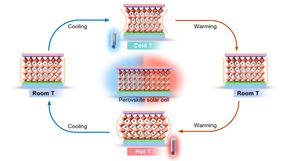Catalyzing new uses for diesel by-products
A new catalytic process could convert by-products of diesel production into more useful chemicals for industry
A new catalytic process discovered at Cardiff University could unleash a range of useful new by-products from diesel fuel production.
More sustainable production of sulphur-free diesel from natural gas and biomass is increasing. However the by-products, hydrocarbons like decane and other low value alkanes have little practical use.
Now a discovery at the University's Cardiff Catalysis Institute has found a potential route for upgrading these by-products into more useful chemicals.
In the past, synthetic reactions starting from alkanes like decane have been fraught with difficulty. They tend either to over-dehydrogenate or to combust, depending on whether oxygen is present in the reaction. Now the Institute, part of the University's School of Chemistry has reported the use of a mixed-metal catalyst to convert decane to a range of oxygenated aromatics.
The breakthrough, published in Nature Chemistry, came when the team fed a gas mixture of decane and air through an iron molybdate catalyst. At higher temperatures, the reaction formed water and decene, which is used in the production of detergents. At lower temperatures, however, the reaction took a different route to create oxygenated aromatic molecules. These included phthalic anhydride, used in the dyeing industry, and coumarin which helps in the production of anti-coagulant drugs.
Professor Stan Golunski, a member of the Institute team behind the discovery said: "This discovery breaks new ground as it implies the involvement of oxygen that has not yet made the full transition from its molecular form to its ionic form. This overturns a widely-held view that this type of oxygen was too reactive to form anything other than carbon monoxide and carbon dioxide in reactions with hydrocarbons."
"While the increased production of sulphur-free diesel has been a positive move, the glut of low value by-products will become a problem. We hope our new process will lead to less waste and the creation of more useful chemicals for a range of industries."
Most read news
Other news from the department science

Get the chemical industry in your inbox
By submitting this form you agree that LUMITOS AG will send you the newsletter(s) selected above by email. Your data will not be passed on to third parties. Your data will be stored and processed in accordance with our data protection regulations. LUMITOS may contact you by email for the purpose of advertising or market and opinion surveys. You can revoke your consent at any time without giving reasons to LUMITOS AG, Ernst-Augustin-Str. 2, 12489 Berlin, Germany or by e-mail at revoke@lumitos.com with effect for the future. In addition, each email contains a link to unsubscribe from the corresponding newsletter.




















































